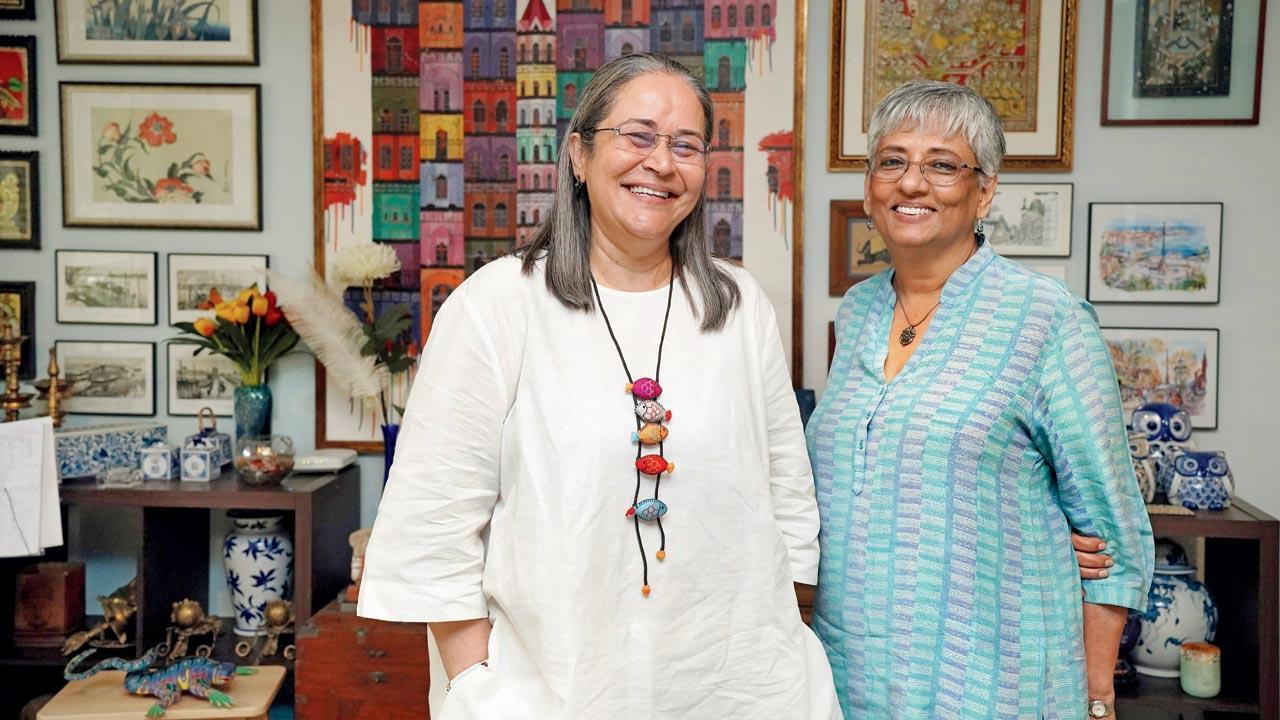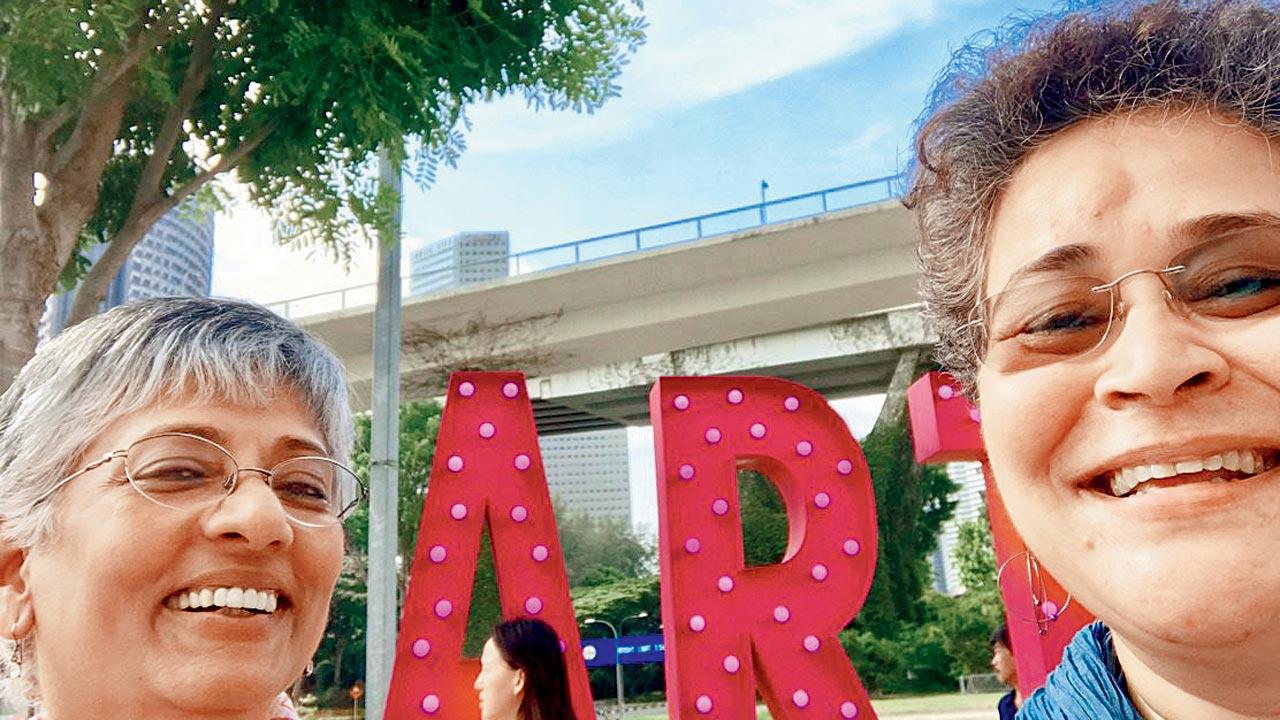When a long-time advocate for civil society pairs with a human and cultural insights expert, the dynamic is expectedly vibrant

Ingrid Srinath with Serena Jacob at her home in Bandra. Pic/Aishwarya Deodhar
 Ingrid Srinath, 60, philanthropy and civil society expert
Ingrid Srinath, 60, philanthropy and civil society expert
ADVERTISEMENT
Serena Jacob, 68, global client director, qualitative, Kantar
These friends are bound by a similar worldview, a love for Western classical music and concern for the city. Each has made radical career shifts—Ingrid Srinath from marketing to civil society, Serena Jacob from academia to marketing.
A passionate advocate for human rights and social justice, Ingrid was the CEO of Child Rights and You (CRY) and founder director of the Centre for Social Impact and Philanthropy at Ashoka University. Currently serving on several non-profit boards, she received the Distinguished Alumna Award from the Indian Institute of Management (IIM), Kolkata in 2020.
 The friends at the Art Fair in Singapore, 2017
The friends at the Art Fair in Singapore, 2017
Starting as a university lecturer in microbiology, Serena is a name to reckon with in the market research sector. Graduating from IIM, Ahmedabad, the former founder partner of Shaman Marketing Research, as well as regional qualitative head of InsightAsia, is presently responsible for overall direction and strategy for the qualitative practice of three operating brands across the APAC markets: Kantar TNS, Kantar Millward Brown and IMRB.
Over to the women of substance, whose dosti lies articulated with les mots justes.
• • •
Ingrid Srinath: We both worked at Pathfinders, the market research division of Lintas, in 1988. The team was small, closely knit. Serena’s innate congeniality meant she was a welcome addition. Shared affinities included a love for reading and language. As well as the lack of family obligations often preventing women from time out with friends.
Serena Jacob: That was my placement job straight out of business school. At first, we were colleagues. Oddly, what made us friends was a North Star Quiz contest. The long train journey to Calcutta, the excitement of the quiz and Ingrid showing me her Calcutta—from the IIM years. It was my first visit.
IS: Reluctant recruits to the quiz, contrary to our expectations we won the national finals. I can still conjure up the aroma of the bhaape ilish at the Bata guesthouse, having to share a room with half a dozen people and going sightseeing in the city.
Also read: The making of a shabdakosh
SJ: At that time, I’m not sure we knew about the mutual interest in Western classical music. The first shows we went for were rock, like the Rolling Stones at Brabourne Stadium. My regular companions for classical concerts were friends from the Paranjoti choir I sang with. On my return to Bombay in 2019, after 12 years in Indonesia and Singapore, Ingrid and I have become each other’s default companion for such concerts.
IS: Our hangouts are the NCPA, Royal Opera House and restaurants after events, like Oh Calcutta in Tardeo, Joshi House in Bandra and Mahesh in Juhu. Getting to NCPA early to partake of the indifferent sandwiches and coffee is a ritual generating disproportionate joy.
SJ: Although Ingrid moved to the social sector, research and data are relevant for her. And I’m interested in philanthropy. The conversation is incredibly diverse: politics, travel stories, family stories, childhood stories… Another bond is food. Ingrid is more the gourmet,
but I cook!
IS: Our families share values including work ethic, liberalism, ambition for children and willingness to make personal sacrifices to permit us greater opportunity. Despite our lifetime friction with our respective mothers, they were strong role models in terms of grit and resilience. The fathers were unequivocally supportive of our choices when these were not in line with societal norms. I suspect my mother sees Serena as one of my few “respectable” friends.
SJ: Ingrid’s mother, Mildred, was also part of the market research world. I know her husband too a bit now. He’s joined us for
recent concerts.
IS: Serena did some qualitative research for CRY when I was there. We empathise with each other’s work stress, enjoying endless rants about clients or colleagues considered unreasonable. But she will “do the right thing” at personal cost. More competent socially, Serena is gentler, nicer, a super-diligent professional. Qualities I aspire to. Comparatively, I’m the wicked witch of the west.
SJ: Ingrid is clear-sighted, certain what needs doing in situations, even if decisions to be taken
and conveyed are unpleasant. She has integrity, intelligence, commitment to excellence, a sense of humour and kindness (she’ll fight this one). I envy her memory, her confidence and the ability to be endlessly interesting.
IS: I’ve visited Serena during her stints in Delhi, Jakarta and Singapore besides our constant concert assignations in Bombay. It’s growing up here in a particular era, with the same values, that is the foundation of our friendship. We both have an overdeveloped sense of fairness. Neither of us has children, so the attention can be sharper focused on careers and interests.
SJ: It’s a good 35 years of knowing each other. We have similar interests, some shared history, yet are different enough to be interesting. Neither presumes to know better or advise each other.
IS: The freedom Bombay affords women has shaped who we are, together with parents raising us in the 1960s to be independent, self-reliant, strong-willed people. Serena travelled alone by BEST bus from Versova to Pedder Road at age eight. My parents were extremely liberal when it came to lack of curfews or going wherever I pleased—impossible for even liberal-minded parents in other cities.
I worry about erosion of civic values, fraternity and cosmopolitanism—from those charged with the city’s governance, the businesses that are its lifeblood, the media which has utterly relinquished responsibilities, the citizens willing to tolerate these behaviours. This has deeply corroded the pillars on which our city’s success is built.
SJ: I’m glad we knew each other and Bombay in that certain time. I’ve gone home on my own by public transport all hours of the night, never anxious. But Mumbai is losing graciousness and charm, becoming pushy, materialistic, downright ugly. We bemoan the quality of its public art and let’s not get started on the state of the roads. Despite this and being overcrowded and madly busy, the city’s vibrancy and energy is pretty wonderful.
Author-publisher Meher Marfatia writes monthly on city friendships. You can reach her at [email protected]/www.meher marfatia.com
 Subscribe today by clicking the link and stay updated with the latest news!" Click here!
Subscribe today by clicking the link and stay updated with the latest news!" Click here!







